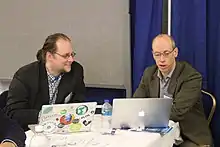Science information on Wikipedia includes the information that Wikipedia presents about science. There have been critiques of and discussions about the impact and quality of that information, and of the interactions of Wikipedia editors, scientists, and public engagement with the information.
Impact
A 2016 study found evidence that Wikipedia increases the distribution and impact of open access science publications.[1] A 2017 study found evidence that Wikipedia's popularity as the most popular general information source has influenced how everyone talks and writes about science.[2][3] UNESCO reported in 2017 that Wikipedia is a popular source of science information because of its high ranking in search engines.[4] A 2018 study examined the way that Wikipedia integrates new scientific information.[5]
Editors

In 2016 the Wiki Education Foundation and the Simons Foundation presented an outreach program called the "Year of Science." In this program, Wikipedia educators visited academic conferences and invited scientists to contribute information from their field of expertise to Wikipedia.[6] Some universities have programs to encourage students to edit Wikipedia's science articles as part of the learning experience.[7] The Wikipedia community invites academics to edit Wikipedia articles.[8] Various academic societies have encouraged their membership to edit Wikipedia.[9]
Quantity and quality
A study in 2017 determined that: "Depending on the definition and methods used, roughly 10–20% of Wikipedia articles are on scientific topics (0.5–1.0 million out of about 5 million)."[2]
Wikipedia has a broad and diverse practice of citing scientific publications of all fields.[10] A 2005 study published in the journal Nature compared 40 Wikipedia articles on science topics to their Encyclopædia Britannica counterpart. Subject experts found four "serious errors" in each encyclopedia. They also found 162 less serious problems in Wikipedia, and 123 in Britannica.[11] A popular science writer for Vice complained in 2017 that Wikipedia's science articles were too technical.[12] Various scientists and media organizations have questioned and critiqued the extent to which Wikipedia articles on science influence political decisions relating to science.[13][14][15]
See also
References
- ↑ Teplitskiy, Misha; Lu, Grace; Duede, Eamon (September 2017). "Amplifying the impact of open access: Wikipedia and the diffusion of science". Journal of the Association for Information Science and Technology. 68 (9): 2116–2127. arXiv:1506.07608. doi:10.1002/asi.23687. S2CID 10220883.
- 1 2 Thompson, Neil; Hanley, Douglas (2017). "Science Is Shaped by Wikipedia: Evidence from a Randomized Control Trial". SSRN Electronic Journal. doi:10.2139/ssrn.3039505. ISSN 1556-5068. S2CID 30918097.
- ↑ Zastrow, Mark (26 September 2017). "Wikipedia shapes language in science papers". Nature. Nature Publishing Group. doi:10.1038/nature.2017.22656.
- ↑ Natural Sciences Sector (9 May 2017). "The UNESCO Science Report finds a new public on Wikipedia". UNESCO. United Nations.
- ↑ Benjakob, Omer; Aviram, Rona (17 April 2018). "A Clockwork Wikipedia: From a Broad Perspective to a Case Study". Journal of Biological Rhythms. 33 (3): 233–244. doi:10.1177/0748730418768120. PMID 29665713. S2CID 4933390.
- ↑ Simons Foundation (1 March 2017). "Mind the Gaps: Improving the Science on Wikipedia". Simons Foundation.
- ↑ Neal, Meghan (11 February 2016). "Science Students Are Writing Wikipedia Articles Instead of Term Papers". Motherboard.
- ↑ Shafee, Thomas; Mietchen, Daniel; Su, Andrew I. (11 August 2017). "Academics can help shape Wikipedia". Science. 357 (6351): 557.2–558. Bibcode:2017Sci...357..557S. doi:10.1126/science.aao0462. PMID 28798122. S2CID 19075849.
- ↑ Goldstein, Evan B. (27 January 2017). "Three Reasons Why Earth Scientists Should Edit Wikipedia". Eos. American Geophysical Union.
- ↑ Arroyo-Machado, Wenceslao; Torres-Salinas, Daniel; Herrera-Viedma, Enrique; Romero-Frías, Esteban; Lozano, Sergi (10 February 2020). "Science through Wikipedia: A novel representation of open knowledge through co-citation networks". PLOS ONE. 15 (2): e0228713. arXiv:2002.04347. Bibcode:2020PLoSO..1528713A. doi:10.1371/journal.pone.0228713. PMC 7010282. PMID 32040488.
- ↑ Terdiman, Daniel (16 December 2005). "Study: Wikipedia as accurate as Britannica". CNET. Retrieved 4 January 2018.
- ↑ Byrne, Michael (12 October 2017). "Wikipedia's Science Articles Are Elitist". Motherboard.
- ↑ Lucassen, Teun; Dijkstra, Roald; Schraagen, Jan Maarten (2012-08-20). "Readability of Wikipedia". First Monday. 17 (9). doi:10.5210/fm.v0i0.3916.
- ↑ Clark, Liat (17 August 2015). "Wikipedia wars are harming politically charged science". Wired.
- ↑ Collins, Nathan (18 August 2015). "The Political Controversy of Wikipedia Science Articles". Pacific Standard.